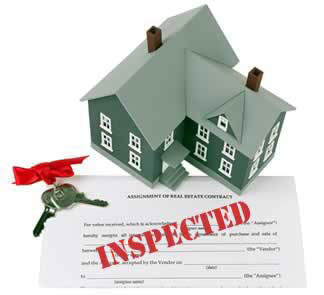If you are in the negotiating phase of purchasing a home, make sure a licensed inspector is hired to search every nook and cranny!
Even if the seller offers an inspection report, be prudent enough not to rely solely on that information since the homeowner may not be fully aware of problems that could exist,
such as hidden mold or even lead in the soil surrounding the home.
Now, this may surprise you but in many states home inspectors are not, necessarily licensed—and it’s legal! In addition to that,
there are a variety of potential concerns that an unlicensed inspector will not touch since certain conditions,
within or surrounding a home, legally require a fully- licensed inspector.
Lets’ take a look those issues that only a licensed inspector can look for and address, as established by the National Association of Certified Homes Inspectors:
Asbestos:
Asbestos is usually found in older homes and can be embedded in the siding, linoleum or wrapped around ductwork.
Asbestos is classified as a known human cancer causer.
If fibers become air-borne, due to any type of disturbance and are breathed in, serious health problems can result, including cancers.
Radon:
Radon is a colorless, odorless, and tasteless radioactive gas that exists in the ground which can seep into one’s home through cracks or other openings in the foundation.
Radon tests from a professional are the only way to thoroughly determine if this cancer-causing gas is present.
Formaldehyde:
Formaldehyde is a common chemical that can emit a colorless gas with a pungent odor, and is not banned.
It, too, poses health risks; and can be found in pressed-wood products, plywood, paneling and foam insulation.
When one repairs a home, one should allow any formaldehyde-containing products to remain unsealed in the garage or outside for several days to allow for gases to dissipate.
Wood-Destroying Pests:
Pest inspections are vital since termites and certain types of ants can literally destroy wood structures.
Licensed inspectors will thoroughly check any accessible areas including any crawl space under the home.
Mold, Mildew and Fungi:
Molds are fungi that reproduce by releasing tiny spores into the air. When they land on moist areas, they can begin to proliferate.
And though there are thousands of different types of molds, some are more of a concern than others, such as black mold which can be fatal, especially for vulnerable infants and the elderly.
Rodents:
A licensed inspector will look for droppings in hidden places as well as chew marks. Mice or rat droppings and urine can cause severe illnesses if allowed to remain in place.
Also, other pesky little rodents can be hiding underground without being, necessarily detected—moles.
These little guys can wreak havoc with one’s yard by constructing tunnels underground that appear as elongated domes on the surface of a home’s yard.
Lead:
If your home was built in 1977 or before, chances could be good that your home contains lead.
When the hazards of lead were finally discovered in 1978, any and all lead-based paints were banned.
Learning disabilities, behavior problems, seizures, neurological disorders, increased dangers to pregnant women and the unborn, and even death are the potential realities associated with lead.
Whenever lead-based paint is scraped or sanded, the risk of becoming poisoned becomes a true concern. Lead can even be present in the ground surrounding a home.
As Dun Hill Homes would tell you, hiring a licensed home inspector is vital if a new home for your family is on the horizon.
Making sure the concerns presented here are given a clean bill of health is essential to the well-being of you and your family!
As a Nebraskan retired school teacher and grandmother, Karen devoted much of her time writing.
From homes in Dallas to sprinkler service in Colorado, she has managed to shed light on numerous fields.





